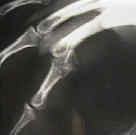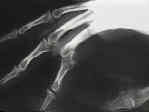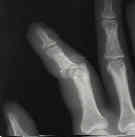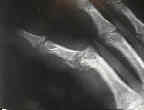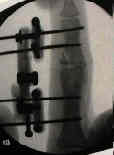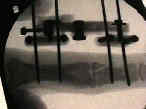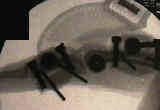- Discussion:
- rare injury caused by compression and rotation with PIP joint flexion;
- may occur as simple dislocations or fracture dislocations;
- it is often unstable and irreducible;
- volar dislocation involves disruption of central slip, along w/ collateral ligaments and palmar plate;
- development of boutonnere deformity is one complication;
- Reduction:
- traction and manipulation of the middle phalanx is carried out while MP joint is held in flexion;
- MP joint is held in flexion prior to reduction inorder to relax the lateral bands;
- difficult reduction may be due to entrapment of lateral bands around the volar aspect of the proximal phalanx;
- Non Operative Treatment:
- following reduction, test ability to actively extend joint;
- if pt can extend joint past 30 deg of of full extension, then apply dorsal splint;
- keep PIP joint in full extension but allow DIP to remain free;
- hence, these are treated similar to boutonnere injuries;
- splinting continues for 3-4 weeks, followed by night splinting for 3 weeks;
- dorsal lip frx:
- up to 2 mm of frx separation may be permitted, but more separation results in extensor mechanism separation;
- Operative Treatment:
- dorsal approach over PIP joint, w/ a gentle curve across the joint;
- incision proceeds between the lateral bands and central slip;
- involves relocation of the lateral bands, reduction of the joint, and repair of the central slip;
- reduction is held in place with a K wire;
- if a fracture fragment is present it may be fixed w/ 0.28 K wire;
- dorsal lip frx:
- more than 2 mm of frx separation requires ORIF and early ROM:
- Complications:
- boutonnere injury;
- psuedo-boutonnere injury:
- involves contracture of volar capsule;
- look for calcification of volar capsule on lateral views
Anterior dislocation of the proximal interphalangeal joint. A cause of rupture of the central slip of the extensor mechanism.
Volar dislocation of the proximal phalangeal joint. Thompson JS and Eaton RG. J Hand Surg. 1977;2:232.


